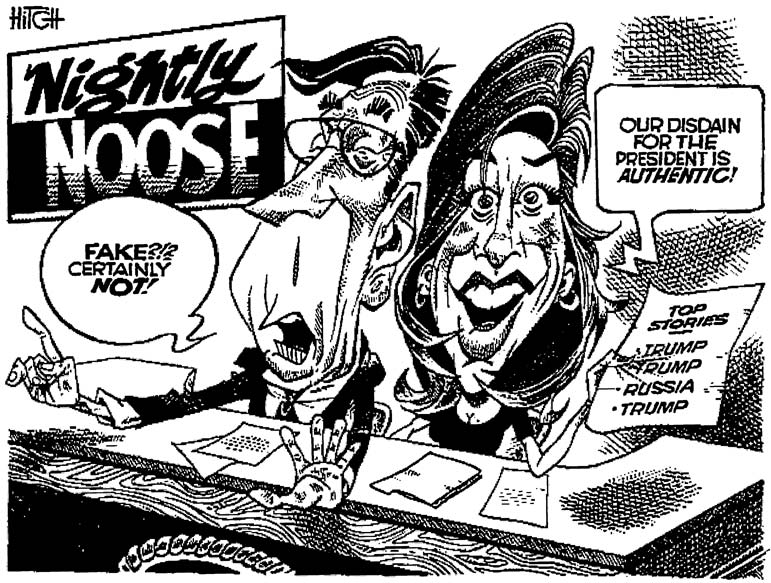
But sometime after midnight, a major consortium of news organizations, using exit polls, called Florida for Bush. So we put out a front page with the headline "Bush Apparent Winner."
Thankfully, only a small percentage of our readers would see that edition on their doorsteps. Those early front pages were just tumbling off the presses when new uncertainty about Florida arose. We changed the headline to one that was more accurate, if less satisfying - "Down to the Wire" - with a secondary line stating that Florida was still in contention.
Small comfort, but plenty of newspapers did much worse with headlines that declared Bush a clear winner. A few even gave the race to Gore. And the TV networks? "We don't just have egg on our face," NBC's Tom Brokaw said afterward. "We have an omelet."
It wasn't only NBC. Several networks first called the election for Gore, then reversed themselves by calling it for Bush, whiplashing their viewers. "At 2:16 a.m., Fox News Channel declared Bush the winner in Florida. Within four minutes, NBC, CBS, CNN and ABC did the same. The AP said the race was still too close to name a winner," the Associated Press recounted later. As it turned out, of course, the nation wouldn't know for many weeks who the next president would be, and then only after contentious recounts involving "hanging chads" and a controversial decision by the U.S. Supreme Court.
You would think that would have scarred media organizations for life and served as a cautionary tale. You might think that 2000 would have adequately prepared the media - and the American public - for the complete unpredictability of what may happen in November 2020 as a nation votes in the midst of a pandemic with a sitting president who is busy creating mistrust in the system and threatening not to accept a defeat.
But there's not much reason for confidence. Recall the 2018 midterms when some media figures rushed to judgment again.
"It's not going to be a wave election," Democratic strategist James Carville sadly intoned early in MSNBC's election coverage that night. CNN's liberal commentator, Van Jones, called the results "heartbreaking" and informed his viewers: "It's not a blue wave."
Except, of course, it turned out to be just that for the House of Representatives, which decisively flipped from red to blue.
Then there was the utter mess of the Iowa caucuses, which caused embarrassment even for CNN's seen-it-all veteran Wolf Blitzer.
"When the results failed to materialize on schedule ... the normally unflappable Blitzer grew increasingly impatient, even slightly agitated, as if channeling the state of mind of a dozen campaign staffs and the millions watching at home," my Washington Post colleague Paul Farhi reported. The embarrassing culmination came with Blitzer attempting to listen in - live - on a phone call between a precinct secretary and a Democratic Party official, which ended in an on-air hang-up.
This time, with the stakes of the election so high, news organizations need to get it right. They need to do two things, primarily, and do them extraordinarily well.
First, in every way possible, they must prepare the public for uncertainty, and start doing this now. Granted, the audience doesn't really show up in force until election night itself, but news reports, pundit panels and special programming can help plow the ground for public understanding of the unpredictability - or even chaos - to come.
Second, on election night and in the days (weeks? months?) to follow, news organizations will need to do the near-impossible: reject their ingrained instincts to find a clear narrative - including the answer to the question "who won?" - and stay with the uncertainty, if that's indeed what's happening.
Are network executives ready to do this?
Some seemed to be in early denial. "We don't want to create a self-fulfilling prophecy of chaos and confusion or suggest somehow that that's a preordained outcome," NBC News president Noah Oppenheim told New York Times columnist Ben Smith last month. But more recently, NBC News and MSNBC announced they would begin a round of programming focused on election security, voting access and misinformation, starting with this weekend's "Meet the Press."
That's good to see - but then there's election night itself. While chaos may not be preordained, it's hard to imagine things proceeding in an orderly way unless Trump wins in a landslide.
No, the more likely occurrences - a close race and/or a Biden win - will make the contentious 2000 election look like a neighborhood block party.
The known factors we're dealing with this year - the plethora of mail-in votes, a sitting president with authoritarian leanings and a proven record of sowing discord, and an attorney general who often functions as his personal lawyer - argue against the likelihood of a calm and buttoned-up outcome.
Journalists and media honchos should be thinking hard about that now, even though it means setting aside their most deeply ingrained instincts.
And they shouldn't stop until it's over, whenever that might be.
Sign up for the daily JWR update. It's free. Just click here.
(COMMENT, BELOW)
Previously:
• 02/13/20: The media keep falling in love --- with anybody but Bernie Sanders
• 10/28/19: Facebook launches a charm offensive --- and vows to pay (some) news organizations for their journalism
• 08/20/19: Redemption sounds nice, but disgraced lib pundit doesn't deserve it
• 06/27/19: Dem debate felt like a nightmare version of speed dating
• 05/27/19: The outsize influence of cable news
• 03/18/19: Social-media platforms were used like lethal weapons in New Zealand --- that must change now
• 01/08/19: Campaign journalism needs an overhaul. Here's one radical idea
• 10/07/18: Nate Silver will make one firm prediction about the midterms, but most journalists won't want to hear it
• 09/07/18: A messy journalistic dilemma if New York Times reporters find out the identity of anonymous op-ed author
• 07/23/18: Mark Zuckerberg is a horror show, but there's a glimmer of truth hidden in his latest blunder
• 06/11/18: Shocked by Trump aggression against reporters and sources? The blueprint was made by Obama
• 05/14/18: Symptoms at NBC hint at a larger sickness
• 10/18/17: From the pen of an 18-year-old Harvey Weinstein: An aggressor who won't be refused
• 01/12/17: BuzzFeed crossed the line in publishing salacious 'dossier' on Trump
• 11/09/16: The media didn't want to believe Trump could win. So they looked the other way
• 11/02/16: Nate Silver blew it when he missed Trump --- now he really needs to get it right
• 10/20/16: How the Committee to Protect Journalists broke its own rule to protest Trump


 Contact The Editor
Contact The Editor
 Articles By This Author
Articles By This Author